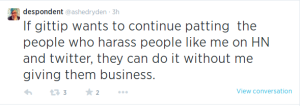I love doing teaching and research, but I also want to be doing more to engage and build communities outside of academia. Recently, I decided to start experimenting with Gittip [Edit: this has now been rebranded as Gratipay] as a way to support that. Gittip “is a way to give small weekly cash gifts to people you love and are inspired by. Gifts are weekly. The intention is for people to depend on money received through Gittip in order to pay their bills, and bills are recurring.” I like the idea, and I liked that the ‘top receivers’ shown on the front page included several activists working on diversity issues, which suggested that it wasn’t just a tool for programmers to use, and that it’s possible to make a decent (if far from extravagant) income doing public outreach and community-building work.
Then, someone on Hacker News criticised the site for supporting people who ‘yell on Twitter and demonize men’, saying the site had become ‘a joke dominated by professional victims’. Sadly, this is not unexpected. The level of daily vitriol directed at women who actively address sexism in tech culture (and in other spaces) is astounding. What was unfortunately is that Chad Whitacre, founder of Gittip, responded this comment by thanking the poster for his feedback.
When people called Whitacre out on this, he responded by saying that he was talking about the part of the comment that referred to the how ‘leaderboards’ were displayed: he was agreeing that perhaps the front page on Gittip shouldn’t focus so heavily on those who give and receive the most funds. I was hopeful that he’d follow this up with a simple and unequivocal statement along the lines of, “Of course we want diversity activists using Gittip! This is an excellent use for the tool and it’s important that we support them.”
Instead, Whitacre’s responses have both tacitly and explicitly supported the ongoing harassment that many of Gittip’s (previous) top users, including Shanley, Ashe Dryden, and Nóirín Plunkett face. Tacitly, by thanking misogynists for their feedback and not speaking up against misogyny, Whitacre supports a culture of harassment that pushes women out of geek communities:
Explicitly, Whitacre has contributed to the ongoing harassment that women working on diversity issues in geek communities face by writing a blog post explicitly attacking Shanley, particularly for the tone of her criticisms of him. I am not going to link to the blog post. And just in case anyone wants to say that Whitacre would have responded better if only someone had explained it to him more politely, it’s clear that other people have been approaching these discussions in a gentler way, and haven’t managed to shift Whitacre’s approach. [Edit: also see Julie Pagano’s email to Whitacre.]
In response to this, many of Gittip’s users have been leaving or are going to leave, including Shanley, Ashe Dryden, Steve Klabnik, and probably many others that I’ve missed [Edit: including Skud]. For many, this comes at a huge cost: people like Ashe Dryden have spent a long time building up their support base on Gittip, and get a significant proportion of their income from the tool. This isn’t a decision taken lightly.
This is what builds homogenous communities. When privileged people fail to stand up for marginalised groups within their communities, those groups eventually understand that they’re not welcome and won’t be supported and leave. Initial shifts towards diversity are rapidly undone.
I’ve shut down my account, too. I don’t want to work to build support through a platform where key communities members are not only unwilling to support their top users, but are also willing to actively attack them.
[Edit: there’s now a page up about this on the Geek Feminism Wiki: Gittip crisis. I’m hoping that in coming days there’ll also be resources compiled around alternatives to Gittip, and about how people can support people who’ve stopped using Gittip.]




















